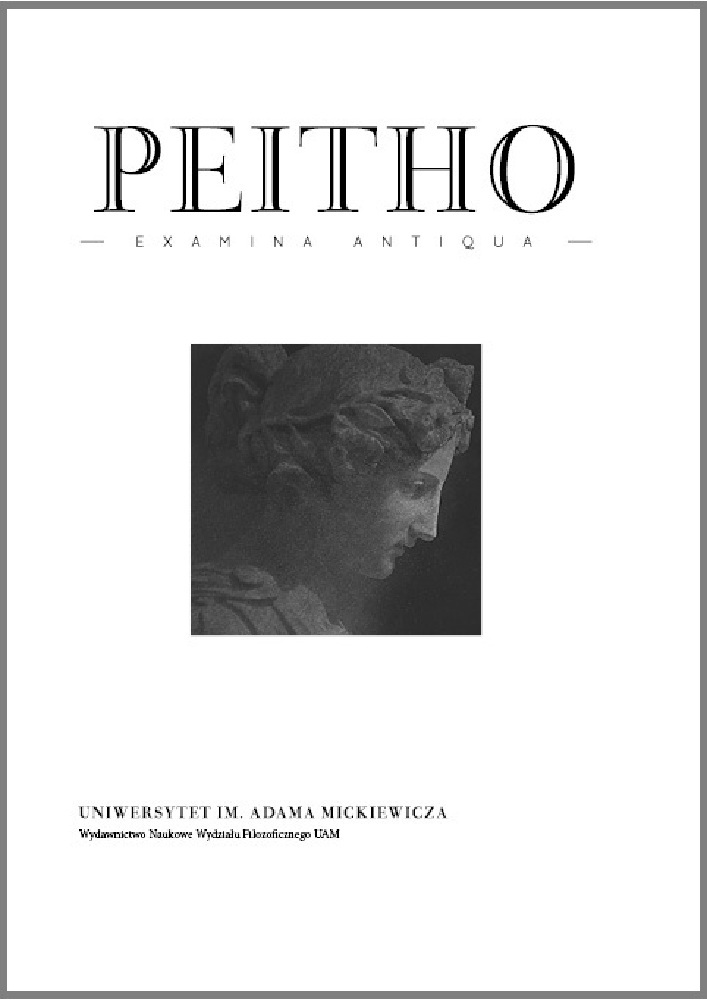Abstract
At the beginning of Book I of the Nicomachean Ethics, Aristotle says that “the good is the same for an individual as for a city”. The good in question is εὐδαιμονία – the highest good achievable for human beings. In Book X, we learn that contemplative activity (θεωρητική) meets best the requirements set for eudaimonia. Even if we agree that contemplative activity is the good for an individual, how should we understand the claim that contemplation is also the good for a city? I start by reminding readers that for Aristotle the Nicomachean Ethics is essentially a political enquiry and should be read together with his Politics. I focus on the teleological character of his political philosophy and the interlinking of the concepts of the good (τἀγαθόν), nature (φύσις), form (τὸ εἶδος, τὸ τί ἐστι, ἡ μορφή), end (τέλος, τὸ οὗ ἕνεκα) and function (ἔργον). Then, I look at Aristotle’s two closely-connected statements that polis exists by nature and that men are political animals. Having taken into account Aristotle’s opinion regarding the imperfection of this world, which is exemplified by the vulnerability of human lives to fortune, luck and accidents, I conclude that Alasdair MacIntyre’s concept of the political community as a common project explains well how contemplation could be the end of polis. Only very few individuals can achieve the highest good and they can do it only if they have the support of the political community. But all the inhabitants of a polis structured towards achieving the highest good benefit from living in a well-ordered community whose constitution reflects the objective hierarchy of goods.
References
Arystoteles (1992–2003), Dzieła wszystkie, t. 1–7, Warszawa.
Barnes, J. (trans.), 1984, The Complete Works ofAristotle, vol. 1–2, Princeton.
Lennox, J. G., 2015, „Aristotle on the biological roots of virtue: the natural history of natural virtue”, w: D. Henry,
K. M. Nielsen (eds.), Bridging the Gap between Aristotle’s Science and Ethics, Cambridge, s. 193–213.
MacIntyre, A., 1996, Dziedzictwo cnoty, tłum. A. Chmielewski, Warszawa.
MacIntyre, A., 1999, Dependent Rational Animals, Chicago.
MacIntyre, A., 2009, „Różne rozumienia Arystotelesa: Arystoteles przeciw pewnym renesansowym arystotelikom”, tłum. P. Machura, w: A. MacIntyre, Etyka i polityka, Warszawa, s. 51–71.
Miller, F. D., 1995, Nature, Justice, and Rights in Aristotle’s Politics, Oxford.
Mulgan, R. G., 1974, „Aristotle’s Doctrine That Man Is a Political Animal”, Hermes 102, s. 438–445.
Newman, W. L. (ed.), 1887, The Politics ofAristotle , vol. 1, Oxford.
Nielsen, K. M., 2015 „Aristotle on principles in ethics: political science as the science of the human good”, w: D. Henry, K. M. Nielsen (eds.), Bridging the Gap between Aristotle’s Science and Ethics, Cambridge, s. 29–48.
Platon, 1997, Prawa, tłum. M. Maykowska, Warszawa.
Popper, K. R. 1984, The Open Society and its Enemies, London.
Randall, J. H., 1968, Aristotle, New York.
Reeve, C. D. C. (transl.), 1998, Aristotle. Politics, Indianopolis–Cambridge.
Skowroński, L., 2014, Arystoteles o celu ludzkiego życia, Nowa Wieś Nad Drwęcą.
Skowroński, L., 2016, „Etyka nikomachejska i Polityka Arystotelesa: ich wspólna dziedzina badań i wspólny czytelnik”, Peitho. Examina Antiqua 7, s. 167–182.
Wesoły, M. A., 2012, „Phronesis — roztropność jako racjonalność praktyczna według Arystotelesa”, w: P. Orlik, K. Przybyszewski (red.), Filozofia a sfera publiczna, Poznań, s. 229–252.
Wesoły, M. A., 2016a, „Księga Δ Metafizyki Arystotelesa ΠΕΡΙ ΤΩΝ ΠΟΣΑΧΩΣ ΛΕΓΟΜΕΝΩΝ Η ΚΑΤΑ ΠΡΟΣΘΕΣΙΝ. O wyrażeniach wielorako orzekanych czyli podług przydawki ”, Peitho. Examina Antiqua 7, 2016, s. 87–121.
Wesoły, M. A., 2016b, „Ethos w filozofii helleńskiej”, Ethos 114, s. 86–107.
License
Peitho provides immediate open access to its content on the principle that making research freely available to the public supports a greater global exchange of knowledge.
